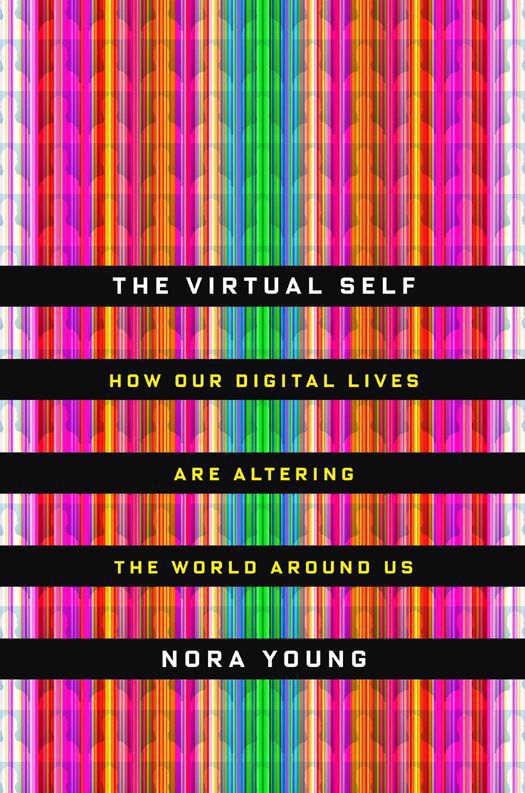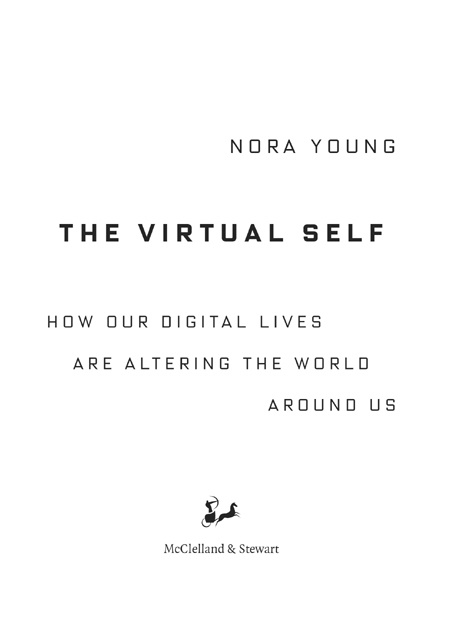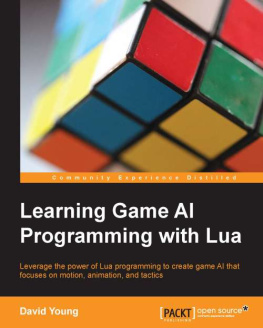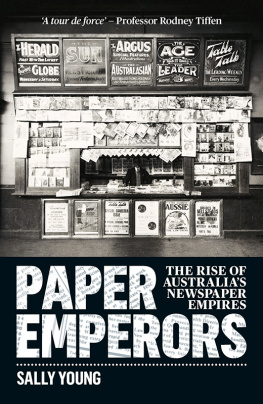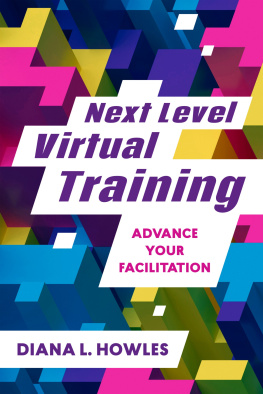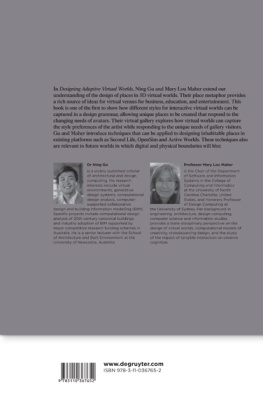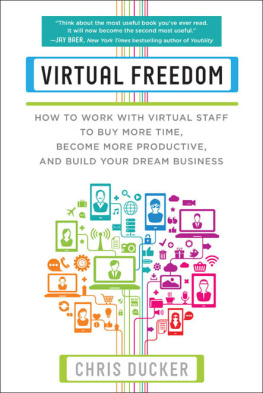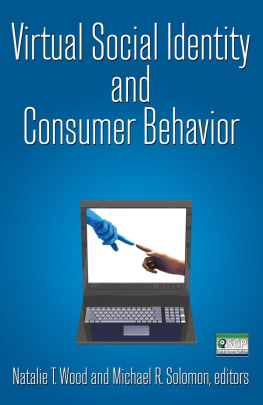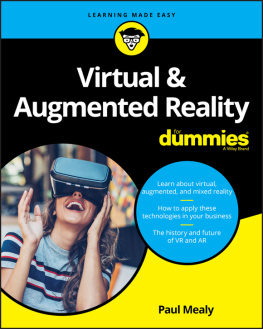Copyright 2012 by Nora Young
All rights reserved. The use of any part of this publication reproduced, transmitted in any form or by any means, electronic, mechanical, photocopying, recording, or otherwise, or stored in a retrieval system, without the prior written consent of the publisher or, in case of photocopying or other reprographic copying, a licence from the Canadian Copyright Licensing Agency is an infringement of the copyright law.
LIBRARY AND ARCHIVES CANADA CATALOGUING IN PUBLICATION
Young, Nora
The virtual self : how our digital lives are altering the world around us / Nora Young.
eISBN: 978-0-7710-7065-5
1. Online social networks. 2. Social media. 3. Personal information management. I. Title.
HM 851. Y 68 2011 303.4833 C 2011-902128-5
We acknowledge the financial support of the Government of Canada through the Canada Book Fund and that of the Government of Ontario through the Ontario Media Development Corporations Ontario Book Initiative. We further acknowledge the support of the Canada Council for the Arts and the Ontario Arts Council for our publishing program.
McClelland & Stewart Ltd.
75 Sherbourne Street
Toronto, Ontario
M 5 A 2 P 9
www.mcclelland.com
Cover Image Credits: Avatar silhouettes: Shutterstock
v3.1
For my parents, Michael and Verda Young
[ CONTENTS ]
Radically
[ INTRODUCTION ]
I t was the pedometers that gave me the most trouble. I say pedometers, plural, because, in the year that I began tracking how far I walked, I went through three of them I lost two, and a third one just stopped working. Id forget to attach the pedometer du jour to my belt, or find that I had inadvertently hit the reset button and had erased the memory for the day. There was a period where I didnt have a pedometer at all, which threw my stats off entirely, as though Id suddenly stopped walking and had taken to being carried by sedan chair.
I did try to monitor my movements over a period of months, but I dont think Im naturally inclined to keep track of my behaviours, to record my exercise, my habits, and my state of mind. Im just not very detail-oriented. Im prone to sudden enthusiasms, and less inclined to the more tedious follow through.
But lots of people are so inclined. They track what they eat, or how they move. They register the places they go during the day using their cellphones, record their mood changes, rate the restaurants theyve eaten in, track the length and pace of their runs. You can do it too: you can sign up for any number of online services, many of them free, that let you track the movies youve watched, the purchases youve made, the routes youve walked, or the beverages youve consumed. As the saying goes, theres an app for that. More and more of us are keeping track of the statistical minutiae of daily life, leading lives that are increasingly numerically documented. But why? What is the particular pleasure in seeing daily experience converted into numbers?
So, out of curiosity, and in spite of my lack of attention to detail, I decided to experiment with tracking my ordinary, banal, everyday habits. I did it for about a year, over the course of working on this book, though Im the first to admit that I was far from rigorous or systematic. Mostly, I wanted to understand why self-tracking was a growing phenomenon, and perhaps along the way, I would understand more about myself. Maybe seeing my life expressed numerically would show me things that the subjective story I like to tell myself wouldnt. My profile showed everything from the exercise Id been doing, to the lunches Id brought to work, to the books Id read, unfolding over time, or displayed in a pie chart of appealing or appalling clarity. I came to think of it as my Data Map, a digital, statistical version of my real, physical life. We are a culture drunk on numbers, and I too was becoming besotted.
This new social habit of tracking our daily behaviours, routines, bodily functions, tastes, and preferences is fuelled in part by our tools. Digital technology makes it easy and fun to engage in this tracking. What would once have been an unwieldy and bizarre commitment to personal informationgathering is now a casual and painless process. At the same time, there are psychological and social factors at work, pushing us to track our moves, and some of those factors are troubling. There can be a compulsive aspect to the practice. In part, this reflects our North American culture of relentless scheduling and our ideology of self-improvement. Its also a sign of a broader problem that affects contemporary digital culture in particular. For all its pleasures and benefits, digital life fundamentally time-shifts and place-shifts us out of the here and now. It is precisely this disembodied, distracted, digital life we lead, I argue, that is creating the urge to document the physical body.
This phenomenon of digital self-reporting comes bundled with very real, pressing issues of privacy. Though we charge ahead with this voluminous documentation of our lives, we havent adequately addressed yet what can be done with this information, such as how and with whom to share it, or how we can anonymize it to shield personally identifying information.
These are large and, to say the least, worrisome caveats, but the growing boom in self-tracking is exciting nevertheless. For while it seems trivial silly, even what is remarkable about self-tracking is the surprising power it offers. At the personal level, it can help us change behaviour, but it also offers insight, providing us with an undeniably clear picture of how we behave. And, really, who among us is not looking for insight into what makes us tick? Ultimately, though, the real value of this self-generated data comes in the aggregate. Pooled with other individuals data, our information offers insight into the broader world. The dream is that we can reveal insights about group behaviour, in the same way my pedometer reveals things about my individual behaviour. That digital record of our individual experience, repeated over and over with countless citizens, can offer insight into everything from where to eat dinner tonight to how diseases are spreading. Properly anonymized, aggregate information about group behaviour can help us plan better, allowing us to make our cities more sustainable, efficient, and responsive. This dream is not a luxury reserved for the developed world, either. Already, being able to track the location of peoples cellphones is helping decision-makers understand how urban planning decisions are affecting slums in Rwanda, and how malaria resources can be used more effectively in Kenya, to name just two examples. Now that most of the worlds cellphone subscribers live in developing countries, their phone data can give those societies in particular vital demographic information.
I can imagine what youre probably thinking right now: that self-tracking is the kind of behaviour that neurotics and narcissists engage in, a sort of digital scab-picking that most people wouldnt dream of. If you think you dont engage in this self-tracking, though, consider this. The people who track how many steps they take, who monitor sleep quality and create charts of how productive they were at work, are the thin edge of a wedge that broadens to include a widespread cultural urge to auto-report, to document the self.

